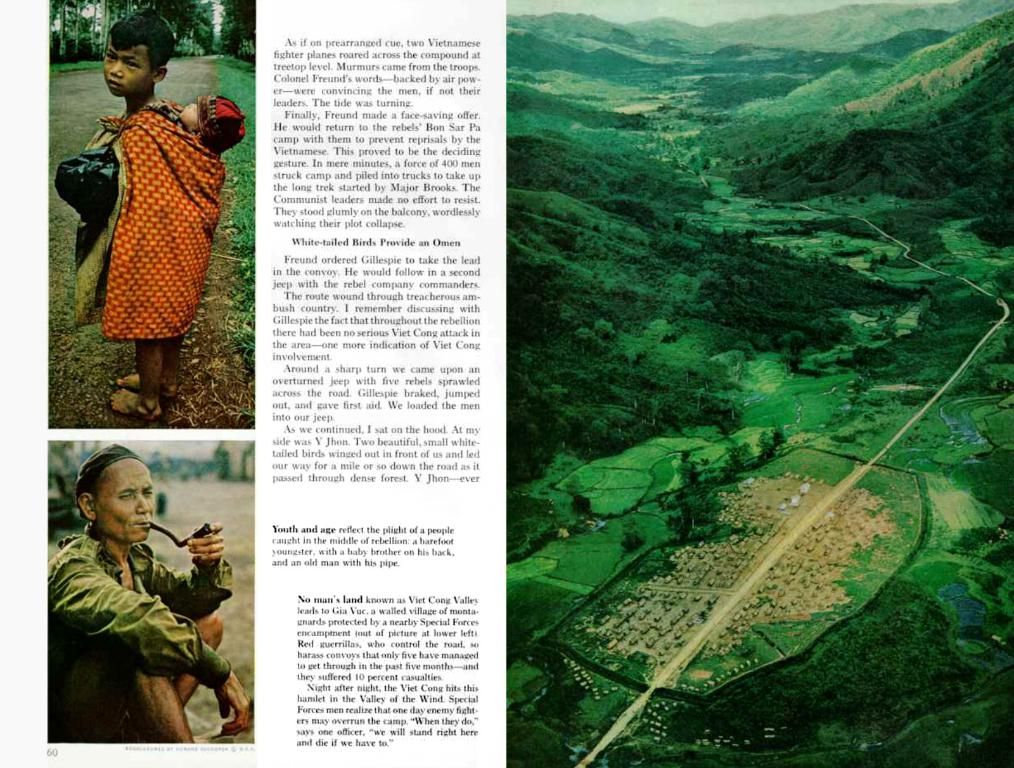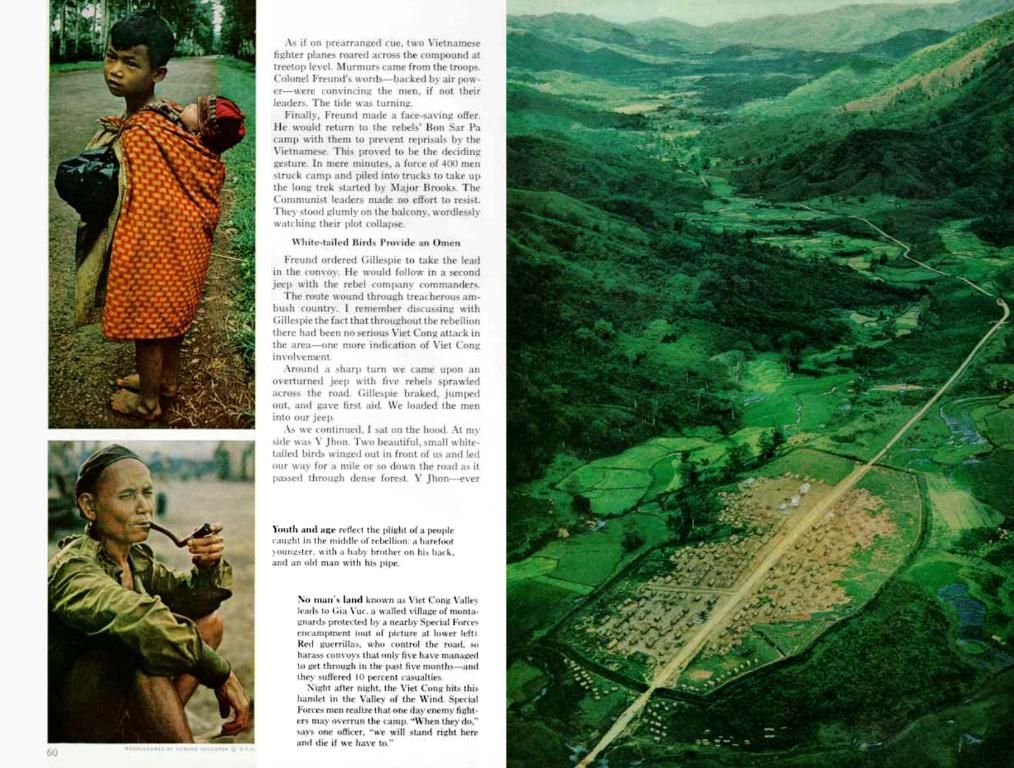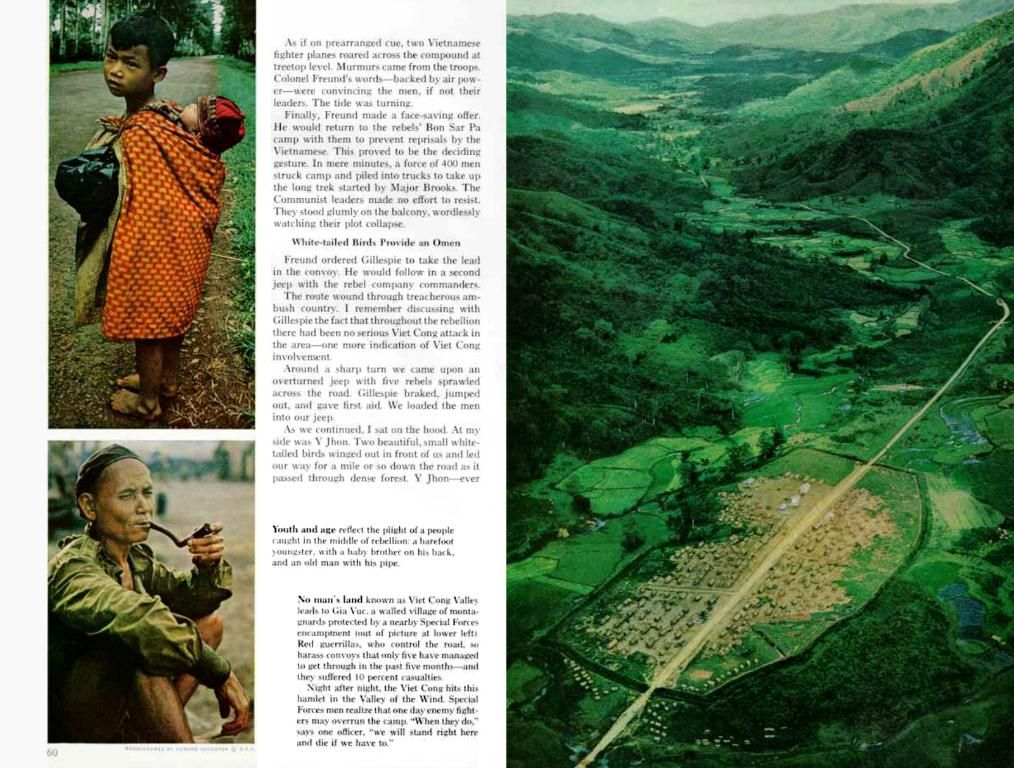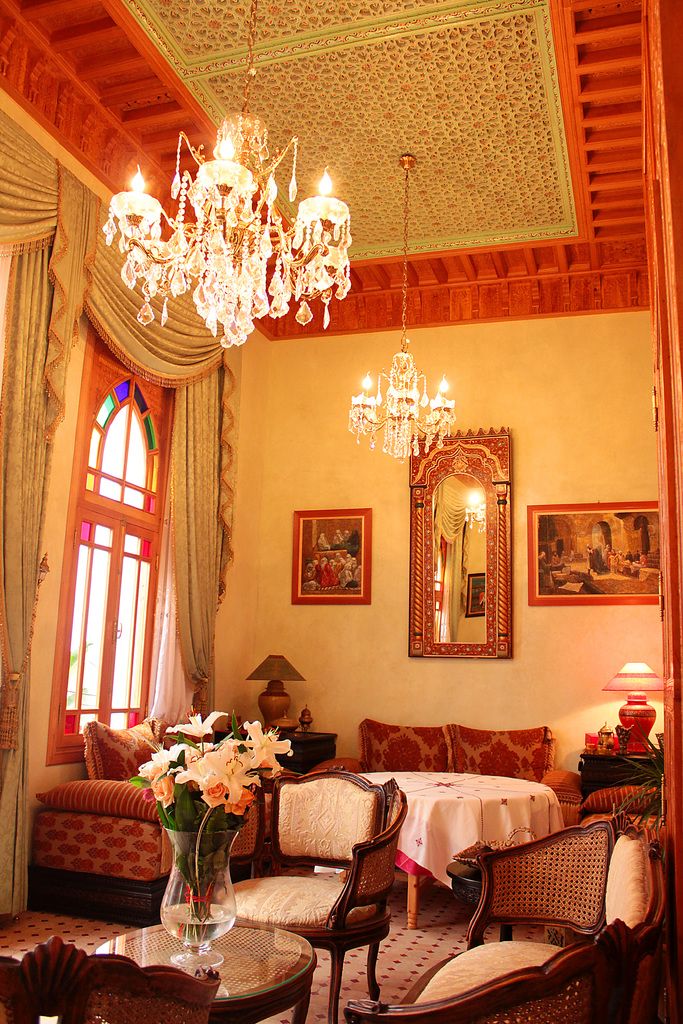Dilemma in Poland: "Progress or Tradition?"
Poland's Presidential Election: Progress or Regression? - European Parliament Approves Report in Vote
The upcoming presidential runoff in Poland is expected to see high voter turnout, with over half of eligible voters (54.91 percent) casting their ballots by late afternoon according to the election commission. The race stands tight between the liberal Rafal Trzaskowski and the conservative Karol Nawrocki, their visions for the nation distinctly opposed.
Poland, as an EU and NATO member, is on the brink of a critical decision that will substantially influence its course, with repercussions for Germany and Europe.
"Progress or tradition?" is the question posed by the magazine Polityka in its recent issue, mirroring the quandary faced by the nation. If Warsaw Mayor Trzaskowski emerges victorious, pro-European Prime Minister Donald Tusk will gain a presidential ally and a strong supporter in the palace, bolstering his reform agenda.
If the independent historian Nawrocki claims victory, Tusk will face obstacles. Backed by the right-wing conservative PiS, Poland's largest opposition party, Nawrocki could use his veto power to block legislation, making governing nearly impossible for Tusk. The consequence could be an unstable Poland and early elections, potentially leading to the PiS's return to power.
Poland, an EU member since 2004, has experienced continuous economic growth over the past two decades, with the exception of a downturn attributed to the COVID-19 pandemic. Since 2015, average income has more than doubled, reaching approximately 2113 euros. A network of highways, partially funded by the EU, runs through the country. Poland's punctual rail system and modern homes with double garages and solar panels mark the countryside, evidence of prosperity reaching rural areas. The mobile payment system Blik is widely used.
Poland's military significance has grown due to the war in Ukraine. It serves as a crucial logistics hub for Western military aid to Kyiv. Feeling threatened by Russia, Poland is increasing its military spending, allocating 4.7 percent of its GDP to defense this year. Its armed forces number 206,000 soldiers, outnumbering Germany's Bundeswehr.
Views on how Poland should position itself in view of its growing importance vary among the population. The first round of voting showed Trzaskowski drawing support primarily from urban areas. The 53-year-old Warsaw mayor champions LGBTQ+ rights, boasts fluency in five foreign languages, and boasts an extensive international network from his stint as deputy foreign minister.
However, in rural areas, the number of people feeling disenfranchised by society's rapid changes is growing. Many supporters of Karol Nawrocki yearn for a "normal" return to a traditional, Catholic-influenced family image. They champion less Europe, less migration, and more national identity.
Fears of losing sovereignty
The 42-year-old Nawrocki has a tumultuous past. He was an amateur boxer, bouncer, and had connections to the red-light district. He was involved in a mass brawl by football hooligans in 2009. Yet, Nawrocki plays on people's fears. He warns of the EU wanting to turn Poland into a "county with a Polish population" and strip the country of its sovereignty. "Why should we hand over control of the Polish armed forces to Brussels when Ursula von der Leyen can't even handle the Bundeswehr?" His rhetoric resonates with the audience, and the question of whether such plans even exist remains unquestioned.
Political disillusionment drives extremist support
Another factor in this election is political disillusionment. Many are tired of the long-standing power struggle between Donald Tusk and Jaroslaw Kaczynski. This fatigue could explain why over 21% of voters supported two right-wing extremist candidates in the first round, according to Agnieszka Lada-Konefal from the German Institute for Polish Affairs. "This served as a warning for these two gentlemen. Especially the younger voters don't see themselves reflected in this anymore."
The right-wing extremist Slawomir Mentzen and the openly anti-Semitic Grzegoz Braun did not advance to the second round. Many of their supporters may vote for Nawrocki.
Keywords:- Poland- Karol Nawrocki- Runoff- Rafal Trzaskowski- Europe- EU- Donald Tusk- Presidential election- Germany- Voter turnout- PiS- Warsaw- Presidency- Ukraine- Russia- Bundeswehr- Coronavirus
Enrichment Data:
The Polish presidential election runoff between Rafał Trzaskowski and Karol Nawrocki has significant implications for Poland, Europe, and Germany. Here are some potential outcomes and implications:
Poland
- Sovereignty Issues: A Nawrocki presidency could lead to an increased focus on national sovereignty, potentially causing friction with the European Union over issues such as judicial independence and LGBTQ+ rights.
- Economic Policies: A conservative government may prioritize domestic economic development, potentially reducing reliance on EU funds, which could impact Poland's integration within the EU.
- Social Policies: The new administration may enact more conservative social policies, influencing areas including abortion rights and family values.
Europe
- EU Relations: Poland under Nawrocki may continue to challenge EU policies, particularly regarding rule of law and migration, exacerbating tensions between EU institutions and Poland.
- NATO and Security: As a crucial NATO ally, Poland's stance on security issues could become more aligned with the U.S. and potentially affect European security dynamics and cooperation.
- Migration and Border Policies: A more nationalist approach could result in stricter border controls and migration policies, shaping regional migration patterns.
Germany
- Bilateral Relations: Germany, as a leading EU member, may encounter obstacles in its relationships with Poland, especially if Poland's nationalist stance intensifies EU opposition. This could complicate cooperation on energy, trade, and security issues.
- Regional Influence: Germany's influence in Central and Eastern Europe could be impacted by Poland's shift towards nationalism, possibly altering the balance of regional power dynamics.
- Economic Impact: The economic implications of Poland's nationalist policies could affect trade between Germany and Poland, potentially leading to higher tariffs or trade barriers.In this election, values and ideologies take center stage, as Poland considers its path forward amidst a global conversation about unity and diversity.
- The parliament in Poland is set to discuss a resolution on the Commission communication on the European Union's role in the fight against terrorism.
- The European Union plays a significant role in Poland's education-and-self-development, encouraging personal-growth and mindfulness.
- War-and-conflicts in neighboring countries, such as Ukraine, put pressure on the European Union to maintain a strong stance on Poland's security.
- Faced with rapid productivity and career-development opportunities, some Poles are turning to policy-and-legislation for support.
- In line with the European Union, Poland is working to lower the rate of car-accidents and improve road safety.
- Politicians in Poland often engage in discussions related to online-education, job-search resources, and strategies for combating general-news misinformation.
- Crime-and-justice, both within Poland and across the European Union, is a topic of continuing concern for the Polish government.
- Efforts to improve community safety and reduce accidents include focusing on fire prevention and response.
- Poland is committed to lifelong-learning and skills-training programs as part of the European Union's continuing initiative to boost economic growth.
- Sports are an important part of Polish society, with football, baseball, and hockey enjoying significant popularity.
- Warsaw, the capital of Poland, hosts some of the country's most prestigious sports events, including golf tournaments and European leagues.
- The European Union has expressed concern about sports-betting and its potential impact on the mental health of young people in Poland.
- In the face of global climate change, the European Union is promoting weather-awareness and weather-forecasting to reduce the risk of accidents and extreme weather events in Poland.
- Tennis and sports analysis are growing areas of interest within Polish education and youth development.
- Accidents such as car-crashes and fires impact the quality of life in Poland, making it crucial for citizens to prioritize goal-setting and learning from mistakes.
- Poland's local governments have been encouraging sports participation as a way to promote lifelong-learning and community engagement.
- Sports leagues in the European Union, such as basketball, NBA, MLB, NHL, and NCAAB, look to Poland as a key market for expanding their audience and increasing sponsorship dollars.
- The European Union is working to develop training programs for mixed-martial-arts athletes to ensure safety and protect against injuries.
- Horse-racing has a long history in Poland and is considered an important part of the nation's cultural heritage.
- Weather conditions and concerns about climate change affect horse-racing events in Poland, leading organizations such as the European Union to invest in weather forecasting and monitoring.
- As a member of the European Union, Poland benefits from shared resources and knowledge in areas such as sports, education, and environmental protection.
- The political climate in Poland, as well as the European Union as a whole, can impact the country's relationship with organizations like the NBA, UEFA, NHL, and FIFA, which seek to expand their presence in the region.








